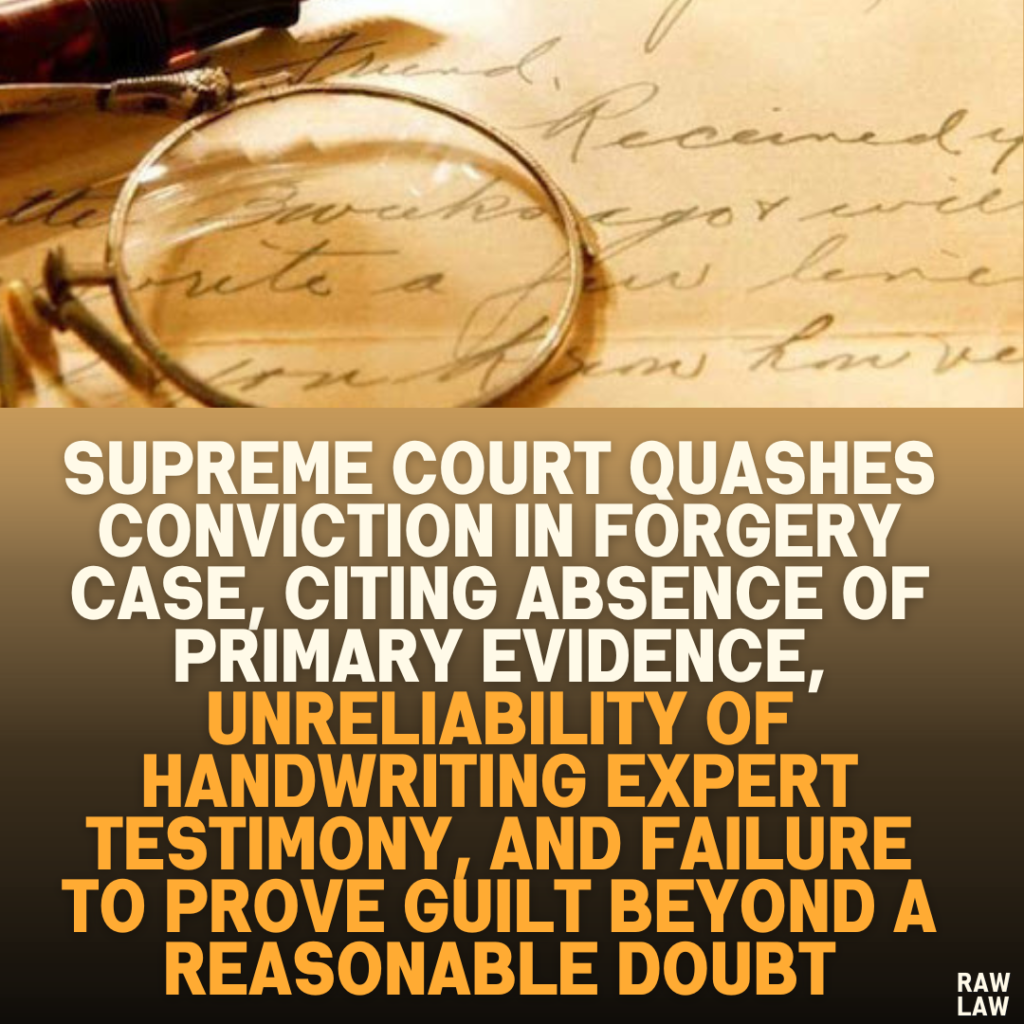Court’s Decision:
The Supreme Court quashed the conviction of the appellant, ruling that the prosecution failed to prove its case beyond a reasonable doubt. The absence of primary evidence (the original postal cover) and the over-reliance on expert testimony led to the Court overturning the previous judgments. The appellant was acquitted of all charges.
Facts of the Case:
- The case revolved around the forgery of an MBBS admission mark sheet. A student had originally scored 767 marks out of 1200, but she submitted a forged mark sheet showing 1120 marks to secure admission.
- During the investigation, it was alleged that the appellant was responsible for preparing the postal cover in which the forged mark sheet was transmitted.
- The trial court convicted the appellant, sentencing him to time already served as an undertrial, along with a fine.
- The conviction was upheld by the appellate court and the High Court before being challenged in the Supreme Court.
Issues Before the Supreme Court:
- Did the prosecution prove that the appellant prepared the postal cover containing the forged mark sheet?
- Was the handwriting expert’s testimony sufficient to establish the appellant’s guilt?
- Did the non-production of the original postal cover weaken the case against the appellant?
Petitioner’s (Appellant’s) Arguments:
The appellant’s lawyer challenged the conviction on multiple grounds:
- Lack of Primary Evidence: The prosecution never produced the original postal cover allegedly written by the appellant. Since the cover itself was missing, the handwriting analysis was meaningless.
- Reliance on Co-accused Testimony: The trial court illegally relied on the statement of a co-accused to convict the appellant. Such testimony, without independent corroboration, is inadmissible in law.
- Weakness of Handwriting Analysis: The handwriting expert’s report was not corroborated by any other evidence. Handwriting analysis is an imperfect science, and it cannot be the sole basis for conviction.
- Circumstantial Nature of Evidence: The case against the appellant was based entirely on circumstantial evidence, which did not conclusively prove his involvement.
Respondent’s (State’s) Arguments:
The prosecution defended the conviction by arguing:
- Handwriting Expert’s Report Was Admissible: The prosecution claimed that the expert conclusively linked the appellant’s handwriting to the postal cover.
- Photocopy of the Postal Cover Was Sufficient: Since the original postal cover was missing, the prosecution relied on a photocopy as secondary evidence.
- Testimony of Key Witnesses Corroborated the Charges: The prosecution pointed out that other witnesses confirmed the appellant’s role in handling the forged documents.
Analysis of the Law:
The Supreme Court analyzed the Indian Evidence Act, 1872, particularly Section 45, which allows expert testimony as evidence.
- Handwriting expert testimony is admissible, but not conclusive. Courts must examine corroborative evidence before relying on such expert opinions.
- The Court referred to Murari Lal v. State of M.P. (1980), which held that while handwriting analysis is relevant, it must be treated cautiously. Unlike fingerprints, handwriting comparison is not an exact science.
- Another relevant precedent, Magan Bihari Lal v. State of Punjab (1977), established that handwriting expert evidence is weak unless strongly supported by other proof.
Precedent Analysis:
- Murari Lal v. State of M.P. (1980) → Expert testimony on handwriting must be scrutinized carefully and is not enough for conviction without corroboration.
- Magan Bihari Lal v. State of Punjab (1977) → Courts should not convict solely based on handwriting analysis unless there is additional supporting evidence.
Court’s Reasoning:
The Supreme Court carefully examined the evidence and found critical flaws in the prosecution’s case:
- The postal cover was missing → Since the key document was never produced, the claim that the appellant wrote on it was unsubstantiated.
- The handwriting expert’s opinion lacked independent proof → Without the actual postal cover in evidence, the handwriting analysis became meaningless.
- The co-accused’s testimony was legally inadmissible → The trial court wrongly relied on statements from another accused person.
- Failure of the prosecution to prove its case beyond a reasonable doubt → The Court stressed that criminal convictions must be based on solid proof, not circumstantial suspicion.
As a result, the Supreme Court ruled that the conviction could not be upheld.
Conclusion:
- The appeal was allowed, and the previous judgments by the trial court, appellate court, and High Court were quashed.
- The appellant was acquitted of all charges.
- The Court reiterated that expert testimony alone cannot be used to convict someone in a criminal case unless backed by strong, corroborative evidence.
Implications of the Judgment:
- Strengthens the requirement for primary evidence → Courts must insist on original documents rather than accepting photocopies as secondary evidence.
- Reaffirms that expert testimony alone is insufficient → Handwriting analysis cannot be the sole basis for conviction unless strongly corroborated.
- Protects against wrongful convictions → The ruling ensures that people are not convicted based on incomplete or weak evidence.
- Sets a precedent for similar forgery cases → Future cases will have to strictly follow evidentiary standards when relying on forensic handwriting analysis.



